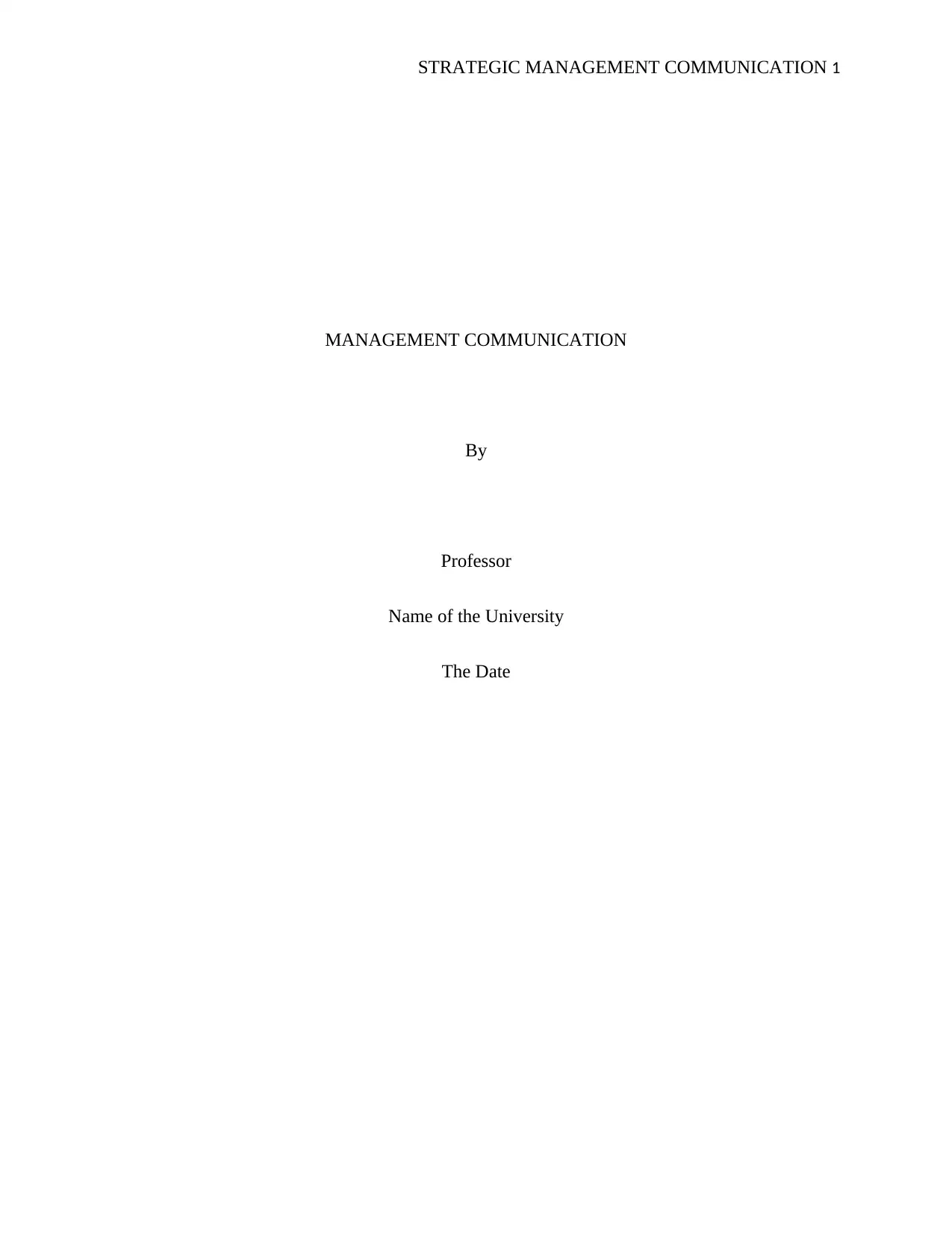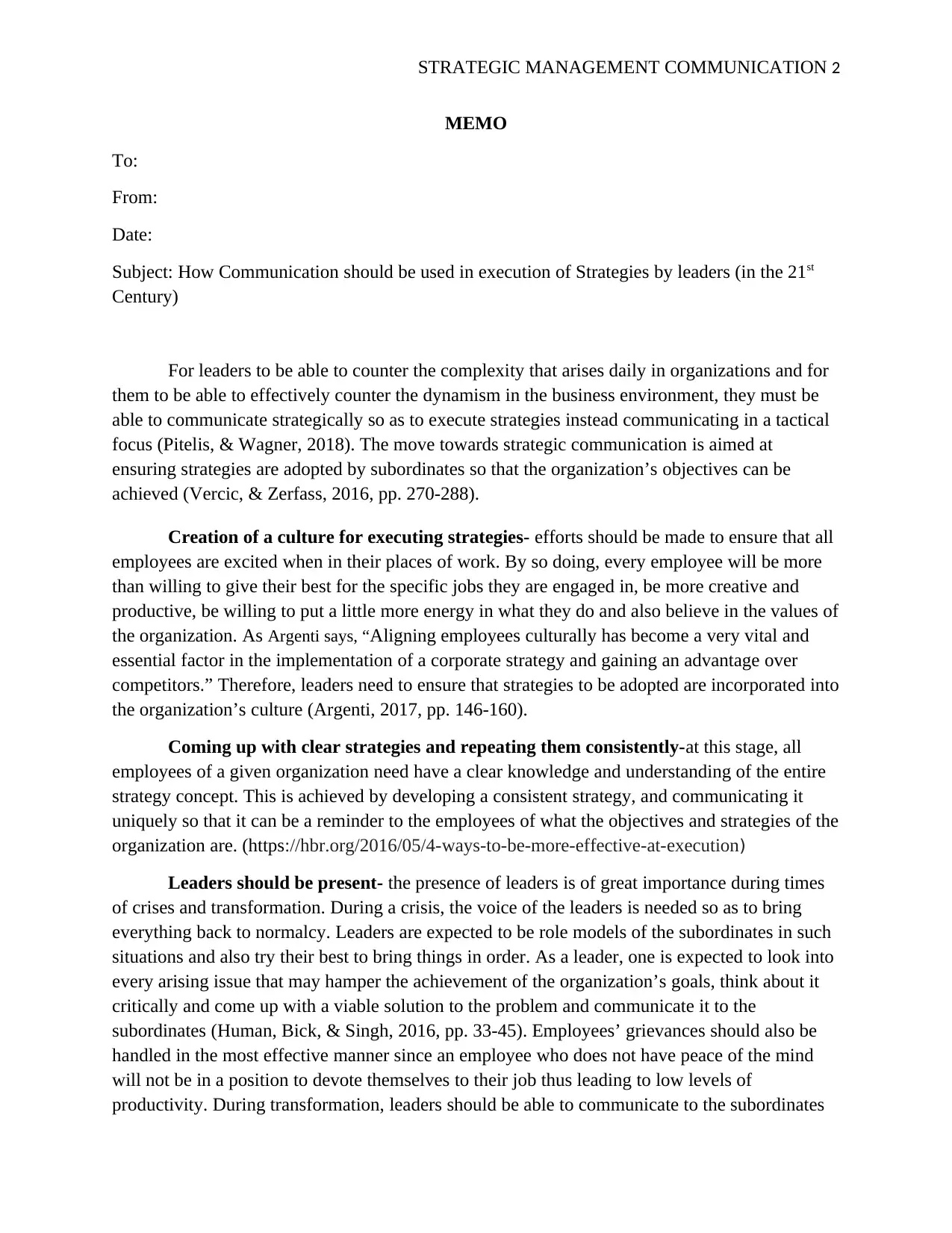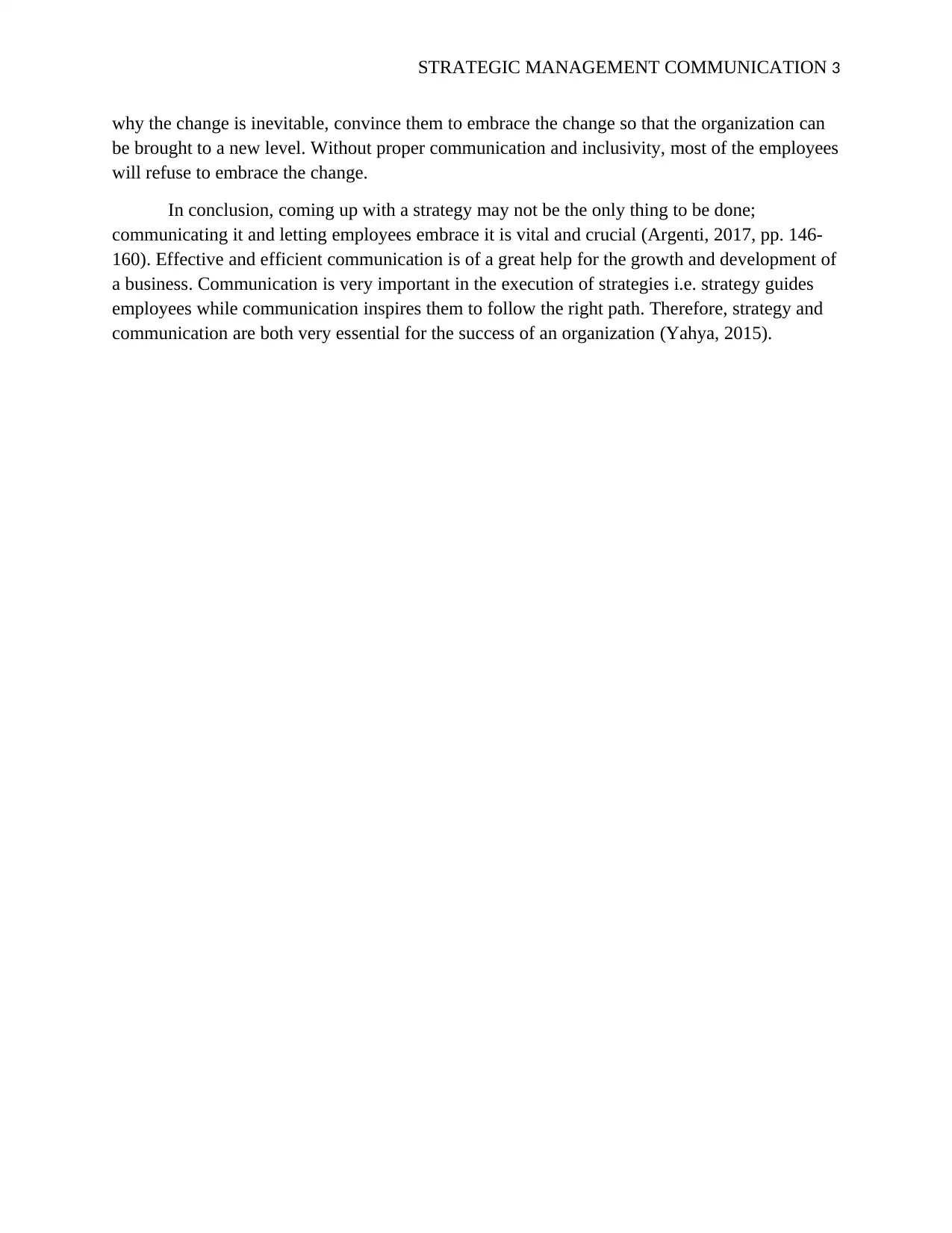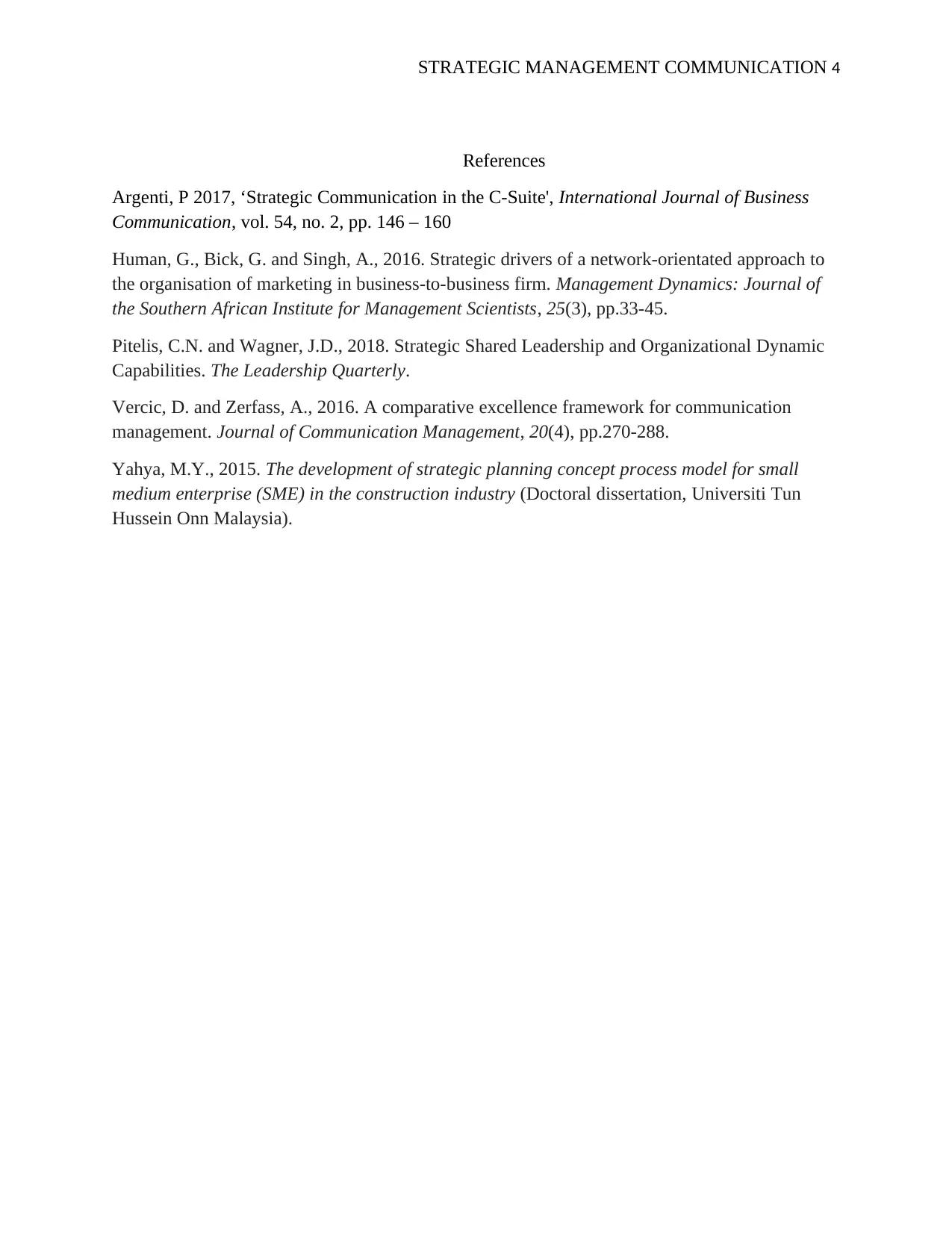MNG81001: Leaders' Strategic Communication in Strategy Execution
VerifiedAdded on 2023/06/04
|4
|844
|189
Report
AI Summary
This report examines the use of strategic communication by leaders in the 21st century to effectively execute organizational strategies. It highlights the shift from tactical communication to a more strategic approach, emphasizing the importance of aligning employees with the organization's culture, consistently communicating clear strategies, and demonstrating leadership presence during crises and transformations. Effective handling of employee grievances is also crucial for maintaining productivity. The report concludes that communication is as vital as strategy itself, guiding and inspiring employees towards the achievement of organizational goals, supported by academic and industry research, showcasing the symbiotic relationship between strategic planning and communication in ensuring organizational success.

STRATEGIC MANAGEMENT COMMUNICATION 1
MANAGEMENT COMMUNICATION
By
Professor
Name of the University
The Date
MANAGEMENT COMMUNICATION
By
Professor
Name of the University
The Date
Paraphrase This Document
Need a fresh take? Get an instant paraphrase of this document with our AI Paraphraser

STRATEGIC MANAGEMENT COMMUNICATION 2
MEMO
To:
From:
Date:
Subject: How Communication should be used in execution of Strategies by leaders (in the 21st
Century)
For leaders to be able to counter the complexity that arises daily in organizations and for
them to be able to effectively counter the dynamism in the business environment, they must be
able to communicate strategically so as to execute strategies instead communicating in a tactical
focus (Pitelis, & Wagner, 2018). The move towards strategic communication is aimed at
ensuring strategies are adopted by subordinates so that the organization’s objectives can be
achieved (Vercic, & Zerfass, 2016, pp. 270-288).
Creation of a culture for executing strategies- efforts should be made to ensure that all
employees are excited when in their places of work. By so doing, every employee will be more
than willing to give their best for the specific jobs they are engaged in, be more creative and
productive, be willing to put a little more energy in what they do and also believe in the values of
the organization. As Argenti says, “Aligning employees culturally has become a very vital and
essential factor in the implementation of a corporate strategy and gaining an advantage over
competitors.” Therefore, leaders need to ensure that strategies to be adopted are incorporated into
the organization’s culture (Argenti, 2017, pp. 146-160).
Coming up with clear strategies and repeating them consistently-at this stage, all
employees of a given organization need have a clear knowledge and understanding of the entire
strategy concept. This is achieved by developing a consistent strategy, and communicating it
uniquely so that it can be a reminder to the employees of what the objectives and strategies of the
organization are. (https://hbr.org/2016/05/4-ways-to-be-more-effective-at-execution)
Leaders should be present- the presence of leaders is of great importance during times
of crises and transformation. During a crisis, the voice of the leaders is needed so as to bring
everything back to normalcy. Leaders are expected to be role models of the subordinates in such
situations and also try their best to bring things in order. As a leader, one is expected to look into
every arising issue that may hamper the achievement of the organization’s goals, think about it
critically and come up with a viable solution to the problem and communicate it to the
subordinates (Human, Bick, & Singh, 2016, pp. 33-45). Employees’ grievances should also be
handled in the most effective manner since an employee who does not have peace of the mind
will not be in a position to devote themselves to their job thus leading to low levels of
productivity. During transformation, leaders should be able to communicate to the subordinates
MEMO
To:
From:
Date:
Subject: How Communication should be used in execution of Strategies by leaders (in the 21st
Century)
For leaders to be able to counter the complexity that arises daily in organizations and for
them to be able to effectively counter the dynamism in the business environment, they must be
able to communicate strategically so as to execute strategies instead communicating in a tactical
focus (Pitelis, & Wagner, 2018). The move towards strategic communication is aimed at
ensuring strategies are adopted by subordinates so that the organization’s objectives can be
achieved (Vercic, & Zerfass, 2016, pp. 270-288).
Creation of a culture for executing strategies- efforts should be made to ensure that all
employees are excited when in their places of work. By so doing, every employee will be more
than willing to give their best for the specific jobs they are engaged in, be more creative and
productive, be willing to put a little more energy in what they do and also believe in the values of
the organization. As Argenti says, “Aligning employees culturally has become a very vital and
essential factor in the implementation of a corporate strategy and gaining an advantage over
competitors.” Therefore, leaders need to ensure that strategies to be adopted are incorporated into
the organization’s culture (Argenti, 2017, pp. 146-160).
Coming up with clear strategies and repeating them consistently-at this stage, all
employees of a given organization need have a clear knowledge and understanding of the entire
strategy concept. This is achieved by developing a consistent strategy, and communicating it
uniquely so that it can be a reminder to the employees of what the objectives and strategies of the
organization are. (https://hbr.org/2016/05/4-ways-to-be-more-effective-at-execution)
Leaders should be present- the presence of leaders is of great importance during times
of crises and transformation. During a crisis, the voice of the leaders is needed so as to bring
everything back to normalcy. Leaders are expected to be role models of the subordinates in such
situations and also try their best to bring things in order. As a leader, one is expected to look into
every arising issue that may hamper the achievement of the organization’s goals, think about it
critically and come up with a viable solution to the problem and communicate it to the
subordinates (Human, Bick, & Singh, 2016, pp. 33-45). Employees’ grievances should also be
handled in the most effective manner since an employee who does not have peace of the mind
will not be in a position to devote themselves to their job thus leading to low levels of
productivity. During transformation, leaders should be able to communicate to the subordinates

STRATEGIC MANAGEMENT COMMUNICATION 3
why the change is inevitable, convince them to embrace the change so that the organization can
be brought to a new level. Without proper communication and inclusivity, most of the employees
will refuse to embrace the change.
In conclusion, coming up with a strategy may not be the only thing to be done;
communicating it and letting employees embrace it is vital and crucial (Argenti, 2017, pp. 146-
160). Effective and efficient communication is of a great help for the growth and development of
a business. Communication is very important in the execution of strategies i.e. strategy guides
employees while communication inspires them to follow the right path. Therefore, strategy and
communication are both very essential for the success of an organization (Yahya, 2015).
why the change is inevitable, convince them to embrace the change so that the organization can
be brought to a new level. Without proper communication and inclusivity, most of the employees
will refuse to embrace the change.
In conclusion, coming up with a strategy may not be the only thing to be done;
communicating it and letting employees embrace it is vital and crucial (Argenti, 2017, pp. 146-
160). Effective and efficient communication is of a great help for the growth and development of
a business. Communication is very important in the execution of strategies i.e. strategy guides
employees while communication inspires them to follow the right path. Therefore, strategy and
communication are both very essential for the success of an organization (Yahya, 2015).
⊘ This is a preview!⊘
Do you want full access?
Subscribe today to unlock all pages.

Trusted by 1+ million students worldwide

STRATEGIC MANAGEMENT COMMUNICATION 4
References
Argenti, P 2017, ‘Strategic Communication in the C-Suite', International Journal of Business
Communication, vol. 54, no. 2, pp. 146 – 160
Human, G., Bick, G. and Singh, A., 2016. Strategic drivers of a network-orientated approach to
the organisation of marketing in business-to-business firm. Management Dynamics: Journal of
the Southern African Institute for Management Scientists, 25(3), pp.33-45.
Pitelis, C.N. and Wagner, J.D., 2018. Strategic Shared Leadership and Organizational Dynamic
Capabilities. The Leadership Quarterly.
Vercic, D. and Zerfass, A., 2016. A comparative excellence framework for communication
management. Journal of Communication Management, 20(4), pp.270-288.
Yahya, M.Y., 2015. The development of strategic planning concept process model for small
medium enterprise (SME) in the construction industry (Doctoral dissertation, Universiti Tun
Hussein Onn Malaysia).
References
Argenti, P 2017, ‘Strategic Communication in the C-Suite', International Journal of Business
Communication, vol. 54, no. 2, pp. 146 – 160
Human, G., Bick, G. and Singh, A., 2016. Strategic drivers of a network-orientated approach to
the organisation of marketing in business-to-business firm. Management Dynamics: Journal of
the Southern African Institute for Management Scientists, 25(3), pp.33-45.
Pitelis, C.N. and Wagner, J.D., 2018. Strategic Shared Leadership and Organizational Dynamic
Capabilities. The Leadership Quarterly.
Vercic, D. and Zerfass, A., 2016. A comparative excellence framework for communication
management. Journal of Communication Management, 20(4), pp.270-288.
Yahya, M.Y., 2015. The development of strategic planning concept process model for small
medium enterprise (SME) in the construction industry (Doctoral dissertation, Universiti Tun
Hussein Onn Malaysia).
1 out of 4
Related Documents
Your All-in-One AI-Powered Toolkit for Academic Success.
+13062052269
info@desklib.com
Available 24*7 on WhatsApp / Email
![[object Object]](/_next/static/media/star-bottom.7253800d.svg)
Unlock your academic potential
Copyright © 2020–2026 A2Z Services. All Rights Reserved. Developed and managed by ZUCOL.


